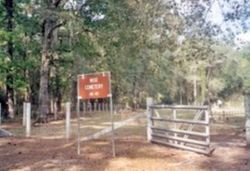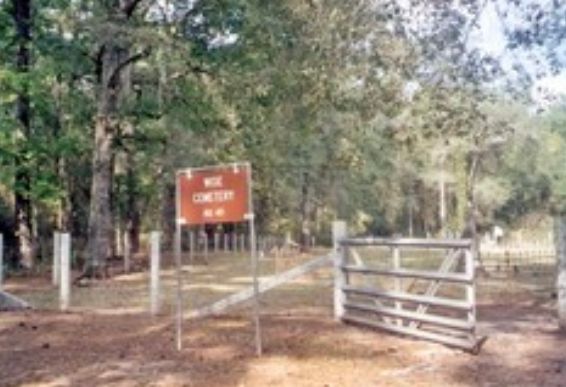Elijah married Delilah Futch (Fuchs) Strickland on August 18, 1832 in Statesboro, Bulloch County at the old Onesimus Futch Plantation. They were the parents of eleven children: Leander Strickland, Mary Ann "Pollie" Strickland Glisson, David Strickland, Henry Elijah Solomon Strickland, Sarah Ann Strickland Davis, Elizabeth Anne Strickland Richardson, Salety Anne Strickland Hobbs, John Elijah Strickland, Martha Anne Elizabeth Strickland White, Emaline Strickland Sims, and Eliza Anne Strickland Sims. In 1856 Elijah and his brother Peter Strickland took over his retired parent's Bryan County, Georgia plantation homesite and lands (believed to be in the Roding area). Elijah and his wife were "pioneers of Bryan County."
In 1860 Elijah and his family were found living in Putnam County, Florida. At the outbreak of the Civil War, in 1862, Elijah and his family returned to Bryan County where he, at 51 years of age, and his son John Elijah Strickland, who died during the war, enlisted in the Confederate Army, first in the Bryan County Hardwick Mounted Rifles and then transferred to Company K of the 7th Georgia Calvary. Another son, David Strickland, also served in the Hardwick Mounted Rifles and later Company K of the 47th Georgia Infantry.
Elijah Strickland died at about age 68 in 1879 in Bryan County and is buried in an unmarked grave near his wife in the Wise Cemetery (Old Backwater Cemetery) in Bryan County. I hope one of Elijah's descendants will add his photo to this site.
According to the late John Wise, like his parents, Elijah's Native American line goes back to the Coree Indians who lived on the Atlantic coast along the Virginia/North Carolina border. Strickland is a common surname among Carolina Indians. By the late 17th century, the Coree population had declined due to disease and war. During the Tuscarora War, some of the surviving Coree fled south seeking refuge among the Cheraw Indians. Later some surviving Cheraws, remnants of other Indian groups, whites, and African Americans became the basis of the contemporary Lumbee Indians.
There are a variety of reasons Native American (American Indian) ancestry may not show up in a person's DNA. One obvious reason is that a person may never have had any Native American ancestors. There are, however, other reasons. For most Americans with Native American ancestors, that ancestry is five or more generations back. In fact it can be so far back in a family tree that it does not show up in DNA tests. Also, most ancestry testing companies use only a small sample of Native American groups (often less than half a dozen tribes) as a reference for testing, and many of those sample groups are from South, rather than North, America. (My own case is a good example of how inaccurate genetics testing companies can be when it comes to Native American ancestry. Three different companies have estimated my Indian ancestry as none, a trace, and 9%.) Another important point about Native American DNA ancestry should be made. Anthropologist Mary Helms created the term "colonial Indian tribes" in the 1960s to refer to societies which originated as recognizable entities only as a direct result of colonial policies. Colonial tribes are often a racially mixed people that over time became identified more with their Indian ancestry rather than their African or white ancestry. These groups are culturally Indian while ultimately having little, if any, Indian DNA. Colonial tribes include groups as diverse as the Miskito Indians of eastern Nicaragua (whom Helms studied); various Amazon tribes in Brazil; the Lumbee Indians of North Carolina; the Black Seminoles of Oklahoma, Mexico, and the Bahamas; and many others. The term colonial tribe attempts to get at the idea that someone can be culturally something (Native American, for example) without being biologically something. So, for all of the above reasons, it should not be surprising that someone with, for example, a Lumbee Indian ancestor would not necessarily test as having significant or any Native American DNA.
Thanks to Elijah's descendant, the late John Wise, for so much of this information. Any errors, however, are mine alone. Please go to the "edit" link on this site with any corrections or additions.
Elijah married Delilah Futch (Fuchs) Strickland on August 18, 1832 in Statesboro, Bulloch County at the old Onesimus Futch Plantation. They were the parents of eleven children: Leander Strickland, Mary Ann "Pollie" Strickland Glisson, David Strickland, Henry Elijah Solomon Strickland, Sarah Ann Strickland Davis, Elizabeth Anne Strickland Richardson, Salety Anne Strickland Hobbs, John Elijah Strickland, Martha Anne Elizabeth Strickland White, Emaline Strickland Sims, and Eliza Anne Strickland Sims. In 1856 Elijah and his brother Peter Strickland took over his retired parent's Bryan County, Georgia plantation homesite and lands (believed to be in the Roding area). Elijah and his wife were "pioneers of Bryan County."
In 1860 Elijah and his family were found living in Putnam County, Florida. At the outbreak of the Civil War, in 1862, Elijah and his family returned to Bryan County where he, at 51 years of age, and his son John Elijah Strickland, who died during the war, enlisted in the Confederate Army, first in the Bryan County Hardwick Mounted Rifles and then transferred to Company K of the 7th Georgia Calvary. Another son, David Strickland, also served in the Hardwick Mounted Rifles and later Company K of the 47th Georgia Infantry.
Elijah Strickland died at about age 68 in 1879 in Bryan County and is buried in an unmarked grave near his wife in the Wise Cemetery (Old Backwater Cemetery) in Bryan County. I hope one of Elijah's descendants will add his photo to this site.
According to the late John Wise, like his parents, Elijah's Native American line goes back to the Coree Indians who lived on the Atlantic coast along the Virginia/North Carolina border. Strickland is a common surname among Carolina Indians. By the late 17th century, the Coree population had declined due to disease and war. During the Tuscarora War, some of the surviving Coree fled south seeking refuge among the Cheraw Indians. Later some surviving Cheraws, remnants of other Indian groups, whites, and African Americans became the basis of the contemporary Lumbee Indians.
There are a variety of reasons Native American (American Indian) ancestry may not show up in a person's DNA. One obvious reason is that a person may never have had any Native American ancestors. There are, however, other reasons. For most Americans with Native American ancestors, that ancestry is five or more generations back. In fact it can be so far back in a family tree that it does not show up in DNA tests. Also, most ancestry testing companies use only a small sample of Native American groups (often less than half a dozen tribes) as a reference for testing, and many of those sample groups are from South, rather than North, America. (My own case is a good example of how inaccurate genetics testing companies can be when it comes to Native American ancestry. Three different companies have estimated my Indian ancestry as none, a trace, and 9%.) Another important point about Native American DNA ancestry should be made. Anthropologist Mary Helms created the term "colonial Indian tribes" in the 1960s to refer to societies which originated as recognizable entities only as a direct result of colonial policies. Colonial tribes are often a racially mixed people that over time became identified more with their Indian ancestry rather than their African or white ancestry. These groups are culturally Indian while ultimately having little, if any, Indian DNA. Colonial tribes include groups as diverse as the Miskito Indians of eastern Nicaragua (whom Helms studied); various Amazon tribes in Brazil; the Lumbee Indians of North Carolina; the Black Seminoles of Oklahoma, Mexico, and the Bahamas; and many others. The term colonial tribe attempts to get at the idea that someone can be culturally something (Native American, for example) without being biologically something. So, for all of the above reasons, it should not be surprising that someone with, for example, a Lumbee Indian ancestor would not necessarily test as having significant or any Native American DNA.
Thanks to Elijah's descendant, the late John Wise, for so much of this information. Any errors, however, are mine alone. Please go to the "edit" link on this site with any corrections or additions.















